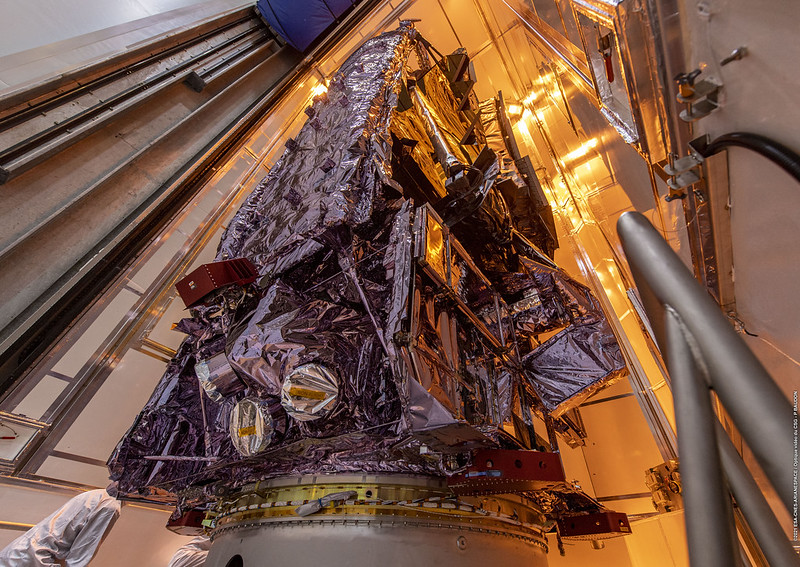Space exploration has become a critical part of modern development. Leading countries in the field, such as the USA, China and Japan, have made tremendous strides in integrating the community and their economy into the future of the Space Industry.
The space sector has been literally basically printing money for the last decade, tripling most investments within five years.
The UK government has said in the past that they want the county to take the same initiative as other world leaders and transform the ‘Old World’ into a space-faring nation.
However, saying something and acting upon it are two different things.
“Global Britain” Becomes “Galactic Britain”
The UK government has unveiled a specialised plan called the UK National Space Strategy with clear goals for changing the country to become part of the Space Industry elite.
The document explains in great detail the projected goal of the UK Space Industry and the country’s goals for the next ten years.
The global space economy was estimated to be at £270 billion in 2019, with a projected increase of up to £490 billion by 2030.
In comparison, the UK Space Industry currently generates an estimated income of £14.8 billion per year. That is quite a big gap.
On top of that, the UK has been struggling with securing building permits for several planned spaceports across Scotland and Ireland, as well as government financing for new tech startups.
The strategy identifies 5 clear goals for the next decade:
- Growing space economy
- Promoting the UK values
- Leading scientific discovery and inspiring the nation
- Protecting national interests in and out of space
- Deliver full space potential for UK citizens and the rest of the world
The term ‘Galactic Britain’ has been circulating social media recently as a bit of a meme joke where sceptic UK citizens are using the term to ridicule the government’s plan as too grand and ostentatious.
Some backlash was received, quoting the goals as too broad, without any concrete plan to support them.
Supporters of the UK National Space Strategy, on the other hand, praised the UK government as bold and looking forward to the future.

As of 2021, there aren’t enough large space industry corporations in the UK that can get behind the plan.
The largest of the tech startups form a trifecta: OneWeb, Skyrora, or Alba Orbital.
The UK National Space Strategy document explores plans of a revolutionary nature that would require an enormous amount of internal and external funding.
However, recent polls have shown that most British tech companies feel resultant to invest in the UK space industry out of fear that their money would not see any returns.
Criticism of the UK National Space Strategy
Hours after the UK government released the UK National Space Strategy, both praise and harsh criticism poured out to greet it.
The Royal Aeronautical Society published a statement on their website, analysing the text.
The RAS began by praising the openness of the document, especially the personal dress of the Prime Minister and the Secretaries of State.
The forward from two high ranking individuals on the government added a personal touch to the strategy, making it seem like a personal appeal rather than an open letter.
The RAS went on to describe the strategy as uninspiring and dull, a repeat of things already said in the past.
However, the Agency stated that the seriousness of these statements would be tested once this year’s government spending review becomes public.
Such changes require a tremendous amount of human power and finances.
It will soon be made clear whether the government is going to put its chequebook where its mouth is or if it will rely on a side hustle to finance the future of the country.
Others did not look so kindly on the personal touch. Some have seen the PM’s forward preceding the official document as a blatant ploy to tug on emotional strings.
The UK National Space Strategy details several improvements within the country that will benefit directly from the rise of a British Space Industry but fails to mention any new funding pots or monetary incentives.
Without concrete mention of funding, the strategy remains a hollow shell.

Scottish Space Strategy
Almost in tandem, the Scottish government has unveiled its own version of the UK National Space Strategy, named the Scottish Space Strategy.
The document explains steps and goals that the country will need to follow to become part of the global space market.
Scotland has recently been making waves within the space sector, having obtained permits to construct several spaceports with launch capacities within two years.
The new strategy will see the Scottish government work closely with its enterprise agencies, industry group Space Scotland and the Scottish Space Academic Forum to secure a £4 billion share of the global space market.
The document details four main goals that the Scottish government will try to achieve by 2030:
- Ensuring Scotland is a global international leader in commercial space developments
- Providing a range of launch services, offering the most powerful launch capability in Europe
- Building an environmental strategy for Scotland’s space industry, reducing carbon emissions, and using satellite data for environmental monitoring
- Growing Scotland’s economic opportunities through exports and investment
Business Minister Ivan McKee has spoken openly about the strategy, claiming that the Scottish space community has the capacity and the drive to make it a reality.
According to the Business Minister, the goals are clear — reaching £4 billion shares of the international space industry, delivering launch capabilities, and creating 20,000 jobs in the sector by 2030.
The strategy has received a favourable nod from the Scottish Space Academic Forum Chair Professor Iain Woodhouse as well.
UK National Space Strategy Is Too Vague
While the UK government still has sway over some of its citizens, many have grown tired of the endless barrage of empty promises.
The UK National Space Strategy goes into too many vague details about the steps necessary to transform the country but gives little to no concrete steps to secure the funding to do so.
Elite actors from the government have stated on many occasions that the country needs to establish an autonomous space program without outside influences such as NASA.
However, little to no local funding is available to make this transition.
So far, the UK government hasn’t published a concrete budgetary plan that will fund the transition.
Final Thoughts
Big ambitions are a good thing. Dreaming big motivates people to get out of bed in the morning and work towards a goal.
However, when a large political body such as a government promises to re-transform an entire country, it needs to use more than promises – it needs finance.
So far, both the UK government and the Scottish government have failed to point towards concrete sources of investments and funding.
For these grand strategies to come true, there needs to be a constant influx of capital into the industry.
Jonathon Spire
Latest posts by Jonathon Spire (see all)
- SocialUpBoost Review 2024 – Scam or Legit? - April 27, 2024
- 5 Best Sites to Buy Negative Google Reviews in 2024 (1 Star, 2 Star) - April 27, 2024
- FollowLiker Review 2024 – Is It a Scam? - April 26, 2024



